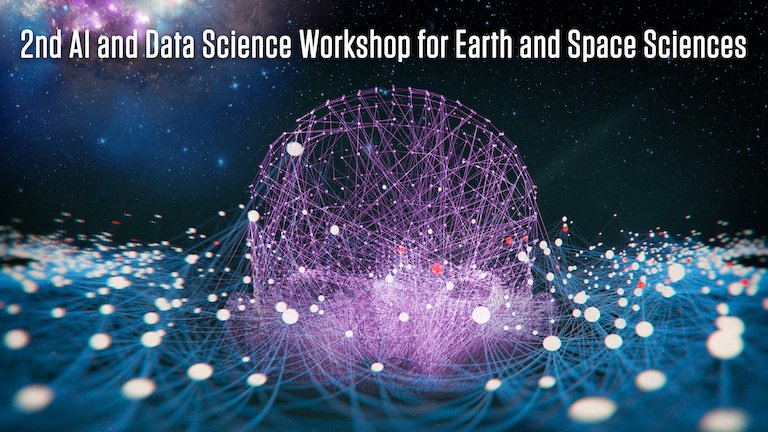Second AI and Data Science Workshop for Earth and Space Sciences
Oct. 1, 2019

Introduction
NASA’s mission of exploration requires leveraging new ways to utilize and learn from the unprecedented amount of data that space-based observation platforms generate. New capabilities are needed, ranging from onboard autonomy for robotic spacecraft to techniques for understanding the world and universe where we live. Artificial Intelligence (AI) and data science are rapidly becoming integral to NASA’s future to drive automation and interpretation.
AI is a collection of advanced technologies that allow machines to think and act, through sensing, comprehending, interacting and learning. AI's foundations lie at the intersection of several traditional fields - Philosophy, Mathematics, Economics, Neuroscience, Psychology and Computer Science. Data Science provides a foundation for bringing software, data, and methodologies together to utilize and interpret data. The cross-disciplinary NASA challenges involving AI and data science require that teams of differing backgrounds come together and integrate capabilities to leverage data effectively.
The NSF, in its 10 Big Ideas, identifies deep integration of “knowledge, theories, methods, data, research communities and languages”, as critical to how research and analysis will be performed in the future, arguing that this multidisciplinary approach may yield entirely “new frameworks, paradigms or even disciplines.” Furthermore, such frameworks must be rooted in data science methodology, following another NSF Big Idea, “Harnessing the Big Data Revolution.”
Although the inception of AI started in the 1950's, the field has recently made a strong comeback in many aspects of society and all over the world; this is mainly due to the timely combination of increased data volumes, advanced and mature algorithms, and improvements in computing power and storage. Current AI and data science applications include big data analytics, robotics, intelligent sensing, assisted decision making, and speech recognition just to name a few.
Compared to Industry and Academia, NASA has specific challenges as well as resources that are particularly well-suited to the use of AI and data science:
- A wealth of data and information to leverage and "learn" from
- Many science- and mission-oriented applications that can benefit from learning on previous data and from domain and expert knowledge
- Extreme challenges unique to NASA’s exploration mission from onboard sensing in remote locations to retrospective and predictive analysis for monitoring our Earth’s state.
Previous Workshop at GSFC
In November 2018, Goddard Space Flight Center hosted the GSFC AI Workshop. This is a follow-on workshop that builds on the progress made in AI, data science, and within NASA in the application of these capabilities to NASA projects This workshop will focus on the following types of challenges:
- Discover events of interest and correlations in large amounts of science data
- Improve the outcomes of science modeling and data assimilation using improved data processing, integration, and analysis
- Design advisors for mission planning and operations, including anomaly detection and spacecraft health monitoring
- Enable new engineering systems and capabilities across NASA directorates
- Enable onboard autonomy using AI
- Develop tools for engineering support, including advanced manufacturing, orbit determination, new component design and system engineering
- Customize intelligent user interfaces, including visual analytics and natural language processing
Workshop Focus
The workshop will be organized as a combination of keynote addresses, invited speakers, short talks and posters centered around specific themes and topics of interest. These are as follows:
- Data-Driven Science – Applications of AI and data science methodologies applied to enable science research at NASA. Support for working with observational data and model output. Data analytics support including i) quantification of uncertainty in inference from big data; ii) use of machine learning to support data mining and pattern recognition; iii) reproducibility in scientific inferences from AI and data science.
- AI in Engineering – Applications of AI and data science methodologies applied to support NASA engineering applications across science, human exploration, and aeronautics. Use of AI methods for simulation, design, and operations.
- Autonomy – Use of AI and data science to enable automated mission operations; onboard application of AI and data science to support autonomous missions including navigation, operations, and science.
- Cross-cutting AI and Data Science activities at NASA – General AI methods and projects applicable to multiple NASA programs including machine learning, image analysis, natural language processing, etc.
- Cross-Agency AI and Data Science activities – AI and data science collaborations across federal agencies
- Emerging Research Topics in AI; Collaborations with Academia – AI and data science collaborations between NASA and academia. Training and educating next generation workforces in AI and data science. Research topics in AI and data science including trust, reproducibility, explainability, human AI interaction, etc.
- Real-World Applications of AI and Data Science – NASA deployed applications in AI and data science.
Abstract Submission
Abstract submission is now closed. Abstracts will be accepted for oral and poster presentations.